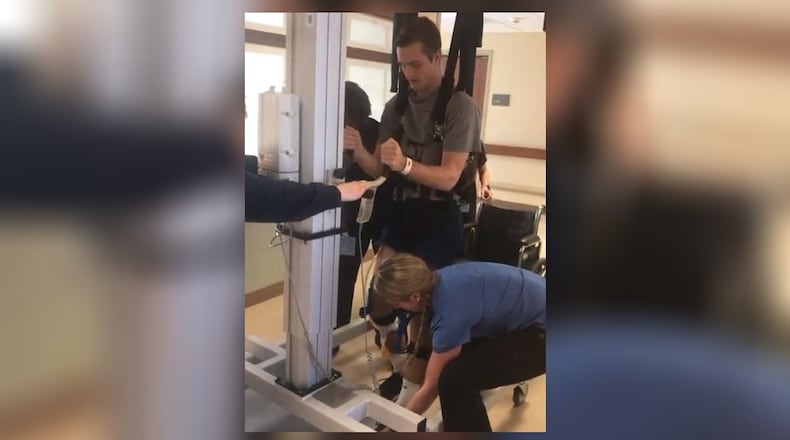Cash had a headache and he was experiencing cold symptoms.
“He went back to college and continued to feel worse throughout the following week” Nanci Cash said.
In the weeks and months that followed, Cash endured a series of tests and treatments attempting to diagnose the illness that was affecting him. He would eventually undergo a grueling rehabilitation, but several medical professionals said Cash has been an inspiration in the way he has handled the situation and worked to rehab.
“Alex was one of the most determined and motivated patients our rehab team has had the privilege to work with,” said Sharon George, Atrium Outpatient Physical Therapist.
On Nov. 30, at a lacrosse practice, the coaches noticed that Cash seemed fatigued, his speech slurred, and his legs were weak. They sent him to the team doctor, who diagnosed a sinus infection and ordered antibiotics.
The next day, he got worse and was sent to the Sewickley Hospital ICU. Doctors diagnosed mononucleosis.
His mother then went to bring him home.
“He was feverish, vomiting, hiccups that would not stop,” Nanci Cash said. “Early Sunday morning, his bladder shut down and we were back at the emergency room for 12 hours. They told us to schedule a visit with the consulting urologist and did not admit him into their hospital.”
On Dec. 5, he was resting in the hotel bed with numbness and tingling in his legs, and he could not move them.
He was rushed to University of Pittsburgh Medical Center. After 12 hours in emergency treatment, a full body MRI, two cat-scans, X-rays, and a battery of other tests, one of which was a test for mono that was negative, he was admitted to the hospital with a temperature of 103 degrees.
Cash was on four antibiotics and a multitude of other fluids through IV. He had paralysis from the waist down, light headedness, double vision, nausea and vomiting and neurological symptoms. At that point, his diagnosis was ADEM (Acute Disseminated Encephalomyelitis). His MRI showed inflammation on his brain and spinal cord, which blocked all the signals from his brain to get to other areas of his body.
Soon, his symptoms worsened. He was rushed to Neurological Intensive Care Unit, where they put him in a medical sedative state and intubated him with a breathing tube. Cash was then able to be moved out of the unit to a neurological floor.
Discharged from UPMC Presbyterian hospital, he was medically transported to Atrium Medical Center in Middletown for intensive physical and occupational therapy.
“When I first met Alex, he couldn’t walk,” said Dee Dee Marts RN, CRRN (certified in rehab). “He needed assistance for almost all activities. I’m sure he was scared.
“As the weeks passed, Alex worked so hard, never questioning anything he was asked to do. So many young men would have been angry or withdrawn, but not Alex. He was always smiling and so pleasant. We would begin to joke around while getting down to business. There were a couple times he would pretend he was going to fall. I would reach to catch him, and he would just laugh.”
When he was able to use a walker for the first time, people clapped when he went down the hallways.
During his semester off, Cash took online classes so that he would not get too far behind. He is now back at college.
“I’m really thankful for everybody who has supported me all this way,” he said. “That being said, I still have to continue to grind to get back to where I want to be in life and live the normal life I had.”
In January, Cash began more rehab through UPMC University of Pittsburgh Medical Center, which focuses on getting him back to playing lacrosse and doing what he loves.
Contact contributing writer shirl54bel@gmail.com
About the Author
